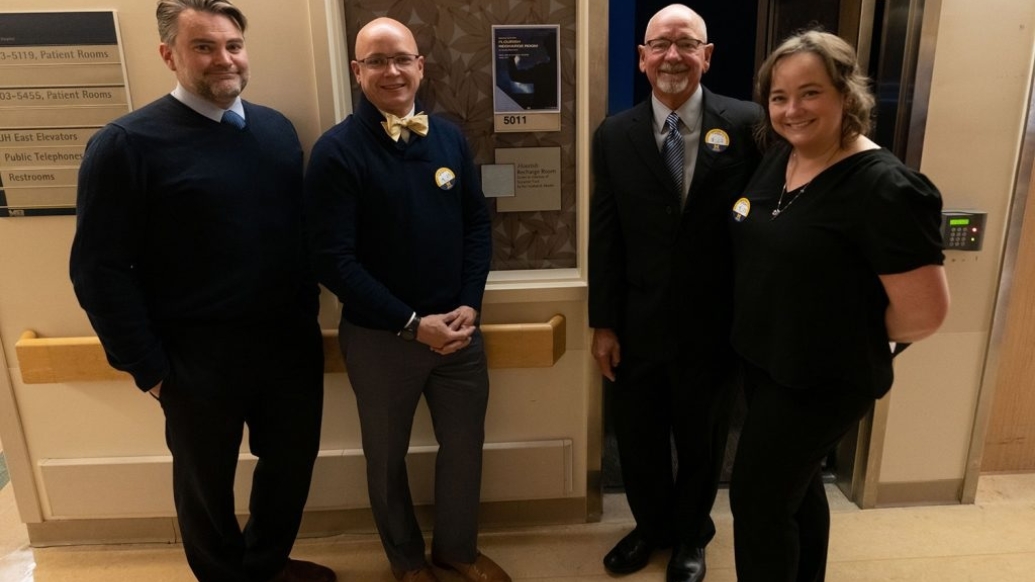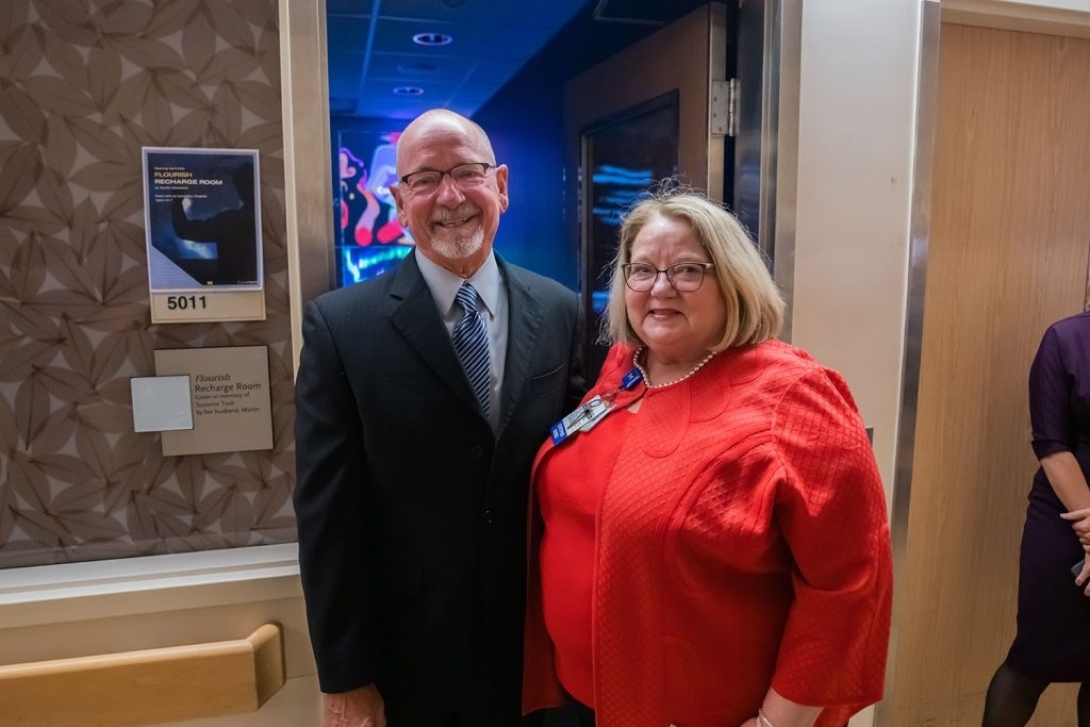
In spring 2021, Michigan Medicine became the first health care system in the Midwest to bring Recharge Rooms to its employees.
These innovative, immersive mental health interventions — located in University of Michigan Health C.S. Mott Children’s Hospital and Von Voigtlander Women’s Hospital, Med Inn, and the Frankel Cardiovascular Center — are designed to support the well-being and resilience of health care workers.
In spring 2023, leaders and staff from U-M Health gathered with Studio Elsewhere, a brain health innovation studio out of Brooklyn, New York, and some very special guests for a ribbon-cutting ceremony to celebrate another first – the opening of the Flourish Recharge Room on the fifth floor of University Hospital.
Helping team members flourish
The Flourish Recharge Room, made possible by a generous gift from Martin J. Tuck, D.D.S., M.S., in memory of his beloved wife Suzanne, is the first of its kind in the country to use technology that creates an interactive mind-body experience.
“Based on neuroscience, the bio-experiential design of this room is innovative for brain health,” said Robin Connelley, chief operating officer for Studio Elsewhere.

Five different scenes bring concepts from nature into the hospital wellness space, with music, interactive technology and generative visuals that respond to the movements of the individuals using the space.
Connelley said the technology helps people transition into a flow state, which is a state of essential joy promoting healing and performance. The unique multi-sensory experience takes the nervous system from fight or flight mode to relax and digest mode, which is something Connelley said can be achieved in as little as five or 10 minutes.
“The big thing is being able to come out of a very serious situation and step into a playful state,” she said. “That tells your body and your brain, ‘I’m safe, everything is okay,’ allowing your body to go into a recovery state.”
Connelley said the Flourish Recharge Room was designed to help health care workers thrive and perform at their highest potential.
A meaningful gift
Dr. Tuck, a retired endodontist who earned his doctor of dental surgery degree from U-M, said his wife Suzanne, who passed away in October 2021, was incredibly grateful for everything the nurses and patient care technicians did for her during her stay as a cancer patient at University Hospital.

“She wanted to give back to them,” he said, “and she wanted it to be something meaningful.”
Dr. Tuck felt just as strongly as his wife did about doing something for the people who had taken such good care of her.
“The nurses on this unit have a special place in my heart,” he said. “I’ve walked these halls many times.”
He approached Caty Johnson, M.S.N., B.S.N., R.N., clinical nursing director on the unit where Suzanne was receiving care, for ideas on how he could support nurses in his wife’s memory. Johnson connected him with the Office of Development for further discussion.
“They shared a list of potential projects,” he said. “This one really resonated with me.”
Building a legacy
Dr. Tuck knew the Flourish Recharge Room was the perfect way to honor his wife’s memory and wishes, and so the work began.
Construction of the room started in December 2021. In November 2022, technology was added. In January 2023, a pilot was launched, sharing demos and gathering feedback from 80 participants.
Three months later, Dr. Tuck and chief nurse executive Nancy May, D.N.P., R.N., AMB-BC, NEA-BC, FAAN, cut the ribbon, officially opening the Flourish Recharge Room for staff, faculty and learners.
“This is such a healing gift for the morale of our teams,” said Dr. May. “Our staff has been through so much in the last few years. We cannot express our gratitude enough to Dr. Tuck and his family.
“Team members can use the Flourish room on breaks and before and after their shifts, too. This will be a huge support for the mental and emotional well-being of our staff,” said May.
Johnson agreed.

“Every nurse I know really cares about their patients and that can take a lot out of you,” said Johnson, who spoke at the ribbon-cutting ceremony. “Having the opportunity to come here and recharge so they can go back and continue to give that amazing care is really what this is all about.”
Dr. Tuck is excited about the benefits the Flourish Recharge Room will provide for staff at U-M Health, and the fact that this first-of-its kind technology could end up supporting others as well.
“This allows us to give back to the nurses who meant so much to Suzanne and me during our time here,” he said. “And it has the potential to grow into a technology that will benefit nurses across the country.”
Clearly moved at seeing the Flourish Recharge Room come to fruition, Dr. Tuck expressed his gratitude to the nurses and other team members who gathered for the ribbon-cutting ceremony.
“This isn’t a gift,” he said. “It’s a thank you.”
Interested in supporting U-M nurses? Make a gift to the Nursing at Michigan Fund or contact Beth Dochinger in the Michigan Medicine Office of Development at 734-763-1723 for information.





